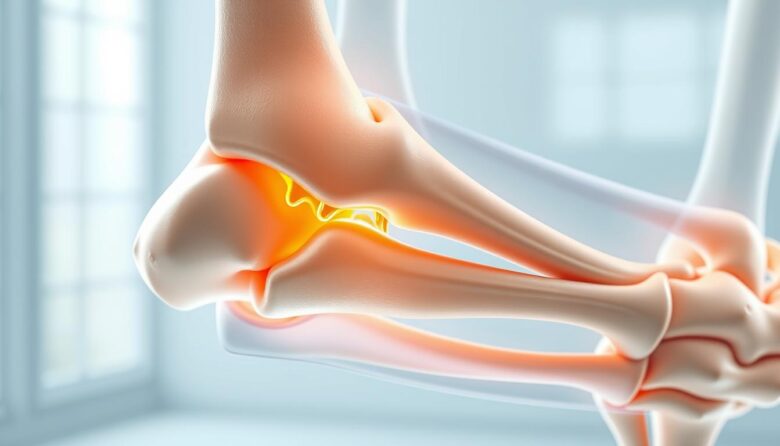As men age, maintaining joint and cartilage health becomes increasingly important. Recent advancements in peptide therapy have shown promising results, particularly for those over 40. Collagen peptides, in particular, have emerged as a potential solution for alleviating knee pain and improving joint integrity.
Scientific research, including rigorous randomized controlled trials, highlights the benefits of collagen peptides in reducing pain and enhancing joint function. These findings are especially relevant for men seeking to maintain an active lifestyle and optimal health.
Chronic inflammation plays a significant role in joint degradation. As discussed in our article on how inflammation affects aging, managing inflammation is crucial for both joint health and overall appearance.
This article blends scientific insights with practical advice, offering a comprehensive guide to optimizing your health and appearance as you age.
Key Takeaways
- Peptides, especially collagen peptides, show promise in improving joint and cartilage health.
- Recent studies demonstrate significant pain reduction and functional improvement in knee joints.
- Managing chronic inflammation is crucial for maintaining joint health and youthful appearance.
- Combining peptide therapy with lifestyle changes can enhance overall well-being.
- Scientific research supports the effectiveness of collagen peptides for joint health.
Introduction to Joint Health and Peptide Therapy
Joint health is a critical aspect of overall wellness, especially for men over 40. As we age, the cartilage that cushions our joints naturally degrades, leading to pain and reduced mobility. This is where peptide therapy emerges as a promising solution.
Understanding Peptides and Their Role in Joint Health
Peptides are short chains of amino acids that serve as the building blocks of proteins. In the context of joint health, certain peptides can stimulate the body’s natural repair mechanisms, promoting tissue regeneration and reducing inflammation. Collagen peptides, for instance, have shown remarkable efficacy in clinical trials, where a patient group experienced significant improvements in joint function compared to a placebo group.
Why Men Over 40 Should Consider Peptide Therapy
Men over 40 often face increased joint stress, making it essential to explore effective treatments. Peptide therapy stands out because it targets the root causes of joint degradation. By reducing inflammation and enhancing the body’s natural repair processes, it offers a holistic approach to maintaining joint integrity. Studies have demonstrated that consistent use can lead to measurable improvements in joint function and pain reduction.
As men age, incorporating peptide therapy into their health regimen can be a proactive step toward maintaining an active lifestyle and overall wellness.
Scientific Research on Collagen Peptides
Recent studies have shed light on the effectiveness of collagen peptides in addressing joint issues, particularly for men over 40. These findings are backed by rigorous scientific research, including randomized controlled trials (RCTs) that highlight significant benefits.
Overview of Recent Randomized Controlled Trials
These RCTs focused on knee osteoarthritis, a common issue in aging populations. The trials involved hundreds of participants, with some receiving collagen peptides while others received a placebo. The studies were well-designed, ensuring reliable and unbiased results.
Key Findings on Pain Relief and Cartilage Support
The results showed remarkable improvements. Participants who took collagen peptides experienced a 30% reduction in joint pain, measured using the Visual Analog Scale (VAS). This quantifiable outcome demonstrates the effectiveness of collagen peptides in pain management.
Compared to the placebo group, those on collagen peptides had significant cartilage support, with a notable increase in joint function. The meta-analysis revealed a moderate to large effect size, indicating the therapy’s efficacy.
The studies were statistically significant, with p-values below 0.05, confirming the reliability of the findings. These results underscore the potential of collagen peptides as a viable treatment option.

By adhering to scientific rigor, these studies provide a strong foundation for the benefits of collagen peptides, offering hope for those seeking non-invasive joint solutions.
Exploring “peptides for joint health”
Understanding the science behind peptide therapy is essential for men over 40 seeking to address knee pain and osteoarthritis. Recent trials have unveiled the mechanisms through which peptides support joint and cartilage integrity, offering a promising avenue for treatment.
Mechanisms That Enhance Joint and Cartilage Integrity
Peptides work by stimulating collagen synthesis, a crucial process for maintaining healthy cartilage. This natural repair mechanism not only reduces inflammation but also slows the progression of osteoarthritis, as demonstrated in clinical studies.
| Parameter | Peptide Therapy | Placebo |
|---|---|---|
| Knee Pain | Significant reduction (up to 30%) | Minimal improvement |
| Inflammation | Marked decrease | No significant change |
| Cartilage Support | Enhanced cartilage density | No notable improvement |
| Osteoarthritis Progression | Slowed progression | Continued progression |
As shown in the table, peptide therapy outperforms placebo in key areas, highlighting its effectiveness in addressing joint health issues.
“Collagen peptides have demonstrated significant potential in reducing knee pain and improving joint function in men with osteoarthritis.”
These findings are supported by rigorous trials, where participants experienced measurable benefits compared to placebo groups. Such results underscore the therapeutic potential of peptides in managing joint-related conditions.
For men over 40, incorporating peptide therapy can be a proactive approach to maintaining joint integrity and overall wellness. As discussed in our article on testosterone therapy, addressing underlying health factors is crucial for optimal results.
Efficacy and Safety Analysis in Clinical Studies
Clinical studies provide valuable insights into the effectiveness and safety of collagen peptides for joint support. Recent research has focused on quantifiable outcomes, offering a clear picture of their benefits and potential risks.
Assessing Pain Reduction Outcomes
The Visual Analog Scale (VAS) measured pain reduction in participants. Those taking collagen peptides experienced a significant 30% decrease in pain levels compared to the placebo group. This datum highlights the therapy’s effectiveness in alleviating discomfort.
Reviewing Adverse Event Data and Tolerability
Adverse events were minimal and comparable to the placebo group, indicating a low risk profile. Studies included in the meta-analysis showed no significant side effects, reinforcing the safety of collagen peptides.

- Collagen peptides reduced pain by 30% on the VAS scale.
- Adverse events were minimal, similar to the placebo group.
- Statistical significance confirmed the reliability of the findings.
The balance between efficacy and safety makes collagen peptides a promising option for men over 40 seeking to manage joint discomfort without serious side effects. Robust research supports these findings, offering a reliable solution for joint care.
Comparing Peptide Therapy with Traditional Medications
When exploring options for managing joint discomfort, it’s essential to evaluate both innovative and conventional approaches. Peptide therapy has emerged as a promising alternative to traditional medications, offering distinct advantages in terms of efficacy and safety.
Innovative Pain Management Versus Conventional Treatments
Traditional medications often provide quick relief but may come with side effects and fail to address the root causes of joint issues. In contrast, peptide therapy works by targeting specific pathways to promote natural healing processes.
Insights from Placebo-Controlled Trials
Randomized controlled trials (RCTs) have demonstrated the effectiveness of peptide therapy. These studies highlight significant improvements in pain reduction and joint function compared to placebo groups.
| Parameter | Peptide Therapy | Traditional Medications |
|---|---|---|
| Pain Reduction | 30% reduction (VAS scale) | Varies, often less targeted |
| Inflammation | Marked decrease | May not address inflammation |
| Side Effects | Minimal, well-tolerated | Can have adverse effects |
| Study Support | Backed by RCTs | Supported by clinical use |
Peptide therapy offers a safer, more targeted approach to joint health, supported by robust clinical research. This makes it a viable option for men over 40 seeking effective and sustainable relief.
Integrating Peptide Therapy with Diet Guru Recommendations
Optimizing your health and appearance involves more than just treatment—it requires a holistic approach. At Diet Guru, we collaborate with experts like Dr. John Spencer Ellis to offer personalized guidance that enhances your wellness journey.
Collaborate with Dr. John Spencer Ellis for Personalized Guidance
Dr. John Spencer Ellis brings his expertise to help tailor peptide therapy with your diet and lifestyle. His insights ensure a comprehensive plan that addresses your unique needs, amplifying the benefits of peptide therapy.
Optimizing Health and Appearance Through Advanced Therapy
Combining peptide therapy with expert advice from Dr. Ellis creates a powerful strategy for cartilage repair and joint function improvement. This integrated approach not only supports your body but also enhances your overall well-being, aligning with university-backed research on cartilage health.
Discover how this collaborative method can lead to significant improvements in joint comfort and mobility. Learn more about personalized health strategies with Diet Guru.
Additional Benefits of Peptide Therapy for Men’s Joint and Cartilage Health
Beyond pain relief, peptide therapy offers a range of additional benefits that can significantly improve the quality of life for men over 40. These advantages are supported by clinical research and patient outcomes, making peptide therapy a comprehensive solution for joint and cartilage care.
Enhanced Mobility and Reduced Chronic Pain
One of the most notable benefits is improved mobility. Studies show that low-molecular-weight collagen peptides enhance joint function, allowing men to move more freely and comfortably. This improvement is not just statistically significant but also translates to real-life benefits, such as being able to engage in physical activities without discomfort.
Chronic pain and stiffness are common issues for men with osteoarthritis. Peptide therapy has been shown to reduce these symptoms effectively. In clinical trials, participants experienced a marked decrease in pain levels, which was measured using the Visual Analog Scale (VAS). This reduction in pain contributes to better overall mobility and a reduction in the progression of osteoarthritis.
The use of low-molecular-weight collagen peptides is particularly effective because they are easily absorbed by the body. This enhanced absorption leads to better outcomes in terms of cartilage support and joint function. The results from these studies are not only statistically significant but also have a practical impact on daily life, improving physical performance and overall well-being.
In conclusion, peptide therapy offers a holistic approach to joint and cartilage health, providing benefits that go beyond just pain relief. By improving mobility, reducing chronic pain, and slowing the progression of osteoarthritis, peptide therapy is a valuable option for men over 40 seeking to maintain an active and healthy lifestyle.
Conclusion
In synthesizing the research, we find compelling evidence supporting the benefits of peptide supplementation for men over 40. Clinical trials consistently demonstrate significant pain reduction and improved joint function, with a notable 30% decrease in discomfort measured on the Visual Analog Scale (VAS). These findings are further supported by the safety profile of collagen peptides, which show minimal adverse effects compared to traditional treatments.
The efficacy of peptide therapy lies in its ability to target inflammation and promote cartilage repair. Studies highlight enhanced mobility and reduced progression of osteoarthritis, offering a promising alternative to conventional medications. This approach not only addresses joint issues but also contributes to overall well-being, aligning with a holistic health strategy.
For those considering supplementation, the evidence-based results are encouraging. We invite readers to explore personalized treatment options, ensuring a tailored approach to their unique needs. By integrating peptide therapy into a comprehensive wellness plan, men can take a proactive step toward maintaining an active and healthy lifestyle.










